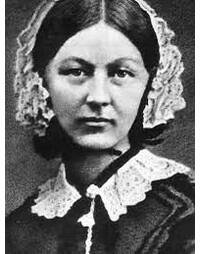Celebrating Florence Nightingale

Being a well-educated daughter of wealthy British parents, she defied social conventions and opted to become a nurse. The nursing of strangers, either in hospitals or in their homes, was not then seen as a respectable career for well-bred ladies, who, if they wished to nurse, were expected to do so only for sick family and intimate friends. In a radical departure from these views, Nightingale believed that well-educated women, using scientific principles and informed education about healthy lifestyles, could dramatically improve the care of sick patients. She believed that nursing provided an ideal independent calling full of intellectual and social freedom for women, who at that time had few other career options.
Nightingale’s achievements showed the medical profession other ways to nurse the sick.
In 1849, Nightingale refused a marriage proposal from a "suitable" gentleman, Richard Monckton Milnes, who had pursued her for years. She explained her reason for turning him down, saying that while he stimulated her intellectually and romantically, her "moral…active nature" called for something beyond a domestic life. (One biographer has suggested that the rejection of marriage to Milnes was not in fact an outright refusal.) Determined to pursue her true calling despite her parents' objections, Nightingale eventually enrolled as a nursing student in 1850 and '51 at the Institution of Protestant Deaconesses in Kaiserswerth, Germany.(1)
In 1854, Nightingale had the opportunity to test her beliefs during Britain’s Crimean War. Newspaper stories reporting that sick and wounded Russian soldiers nursed by religious orders fared much better than British soldiers inflamed public opinion. In response, the British government asked Nightingale to take a small group of nurses to the military hospital at Scutari (modern-day Üsküdar, Turk.).
Although they had been warned of the horrid conditions there, nothing could have prepared Nightingale and her nurses for what they saw when they arrived at Scutari, the British base hospital in Constantinople. The hospital sat on top of a large cesspool, which contaminated the water and the building itself. Patients lay in their own excrement on stretchers strewn throughout the hallways. Rodents and bugs scurried past them. The most basic supplies, such as bandages and soap, grew increasingly scarce as the number of ill and wounded steadily increased. Even water needed to be rationed. More soldiers were dying from infectious diseases like typhoid and cholera than from injuries incurred in battle. (1)
Within days of their arrival, Nightingale and her nurses had reorganized the barracks hospital in accordance with 19th-century science: walls were scrubbed for sanitation, windows opened for ventilation, nourishing food prepared and served, and medications and treatments efficiently administered. Within weeks death rates plummeted, and soldiers were no longer sickened by infectious diseases arising from poor sanitary conditions. Within months a grateful public knew of the work of the “Lady with the Lamp,” who made nightly rounds comforting the sick and wounded. (2)
Nightingale remained at Scutari for a year and a half. She left in the summer of 1856, once the Crimean conflict was resolved, and returned to her childhood home at Lea Hurst. To her surprise she was met with a hero's welcome, which the humble nurse did her best to avoid. The previous year, Queen Victoria had rewarded Nightingale's work by presenting her with an engraved brooch that came to be known as the "Nightingale Jewel" and by granting her a prize of $250,000 from the British government.
Nightingale decided to use the money to further her cause. In 1860, she funded the establishment of St. Thomas' Hospital, and within it, the Nightingale Training School for Nurses. Nightingale became a figure of public admiration. Poems, songs and plays were written and dedicated in the heroine's honor. Young women aspired to be like her. Eager to follow her example, even women from the wealthy upper classes started enrolling at the training school. Thanks to Nightingale, nursing was no longer frowned upon by the upper classes; it had, in fact, come to be viewed as an honorable vocation. (1)
By the end of the 19th century, the entire Western world shared Nightingale’s belief in the worth of educated nurses.
References
- https://www.biography.com/scientist/florence-nightingale
- https://www.britannica.com/science/nursing
- Monica E. Baly, Florence Nightingale and the Nursing Legacy (1986)
Although the origins of nursing predate the mid-19th century, it was Florence Nightingale who graced the history books of being one of the greatest nurses. Florence Nightingale was born in Florence, Italy on May 12, 1820.




